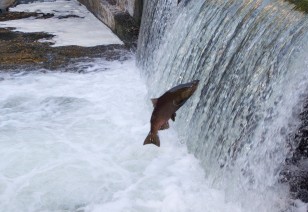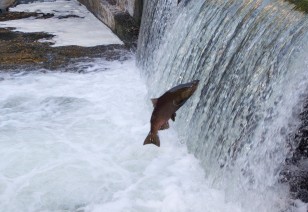 All it takes is a few scaly escape artistsLast week the Center for Food Safety reported that the FDA had frozen out the U.S. Fish and Wildlife Service and National Oceanic and Atmospheric Administration in its rush to approve AquaBounty’s transgenic salmon for human consumption. Some have since suggested that this wasn’t a problem, since the two agencies’ concerns weren’t specific to AquaBounty’s indoor-only system and relied on old studies. Now, new revelations show that the government’s fisheries and marine experts were explicitly concerned about the FDA’s behavior — and that the agency seems to be intentionally understating the real risks of AquaBounty’s salmon.
All it takes is a few scaly escape artistsLast week the Center for Food Safety reported that the FDA had frozen out the U.S. Fish and Wildlife Service and National Oceanic and Atmospheric Administration in its rush to approve AquaBounty’s transgenic salmon for human consumption. Some have since suggested that this wasn’t a problem, since the two agencies’ concerns weren’t specific to AquaBounty’s indoor-only system and relied on old studies. Now, new revelations show that the government’s fisheries and marine experts were explicitly concerned about the FDA’s behavior — and that the agency seems to be intentionally understating the real risks of AquaBounty’s salmon.
Food & Water Watch (FWW) has posted a new set of emails from Fish and Wildlife Service officials that indicate deep concerns about the safety of the GE salmon. Even worse, they believe the FDA to be skirting the law in its approval process for the fish. According to FWW, “high-ranking officials” complained that, though the Endangered Species Act requires the FDA to consult with Fish and Wildlife over anything that would affect wild Atlantic salmon, the agency never set up a process by which to do it.
These officials also raised concerns that despite AquaBounty’s claim that its fish are sterile (and thus unable to reproduce with wild salmon), the genetic manipulation techniques the company uses are not foolproof: up to 3 percent of its fish may indeed be fertile and thus capable of reproducing with wild fish in the event of an escape.
As one Fish and Wildlife Service scientist wrote in an incredulous email: “Maybe they [the FDA] should watch Jurassic Park.”
How would they escape? Would these new salmon miraculously sprout legs? No need: turns out AquaBounty is considering building a facility to grow its fish that would discharge water into the ocean off the Maine coast — prime Atlantic salmon habitat. As one Fish and Wildlife official put it, “No matter what precautions you take, fish escape and once they do, there is no closing that door … I think it is very bad precedent to set.”
Some of this rush to approval — the FDA may rule in favor of the GE salmon as soon as Nov. 23 — clearly comes from the FDA’s strongly held belief that so-called “tail risk” doesn’t exist with GE salmon. Tail risk is the au courant term for “highly unlikely but potentially devastating” events, the end of a curving risk graph. The last industry to ignore tail risk was the financial sector. And we all know how that turned out.
Apparently, the FDA feels perfectly comfortable playing roulette with an endangered species in order to help a single company’s bottom line.
Introducing a sustainable new taste sensation: Arctic salmon!
But really this all comes from an attempt to ignore an even larger reality. Instead of insisting on eating a fish whose stock is fast disappearing in the wild and is unsuitable to environmentally sustainable aquaculture, we could — as Four Fish author Paul Greenberg suggests — switch over to another delicious, pink-fleshed fish that is closely related to salmon: the Artic char.
Unlike salmon, which are carnivorous (requiring lots of fish to grow big) and raised in ocean-based pens that can wreak environmental havoc, Arctic char is raised in land-based, freshwater systems that aren’t nearly as resource intensive. Even Monterey Bay Aquarium’s Seafood Watch rates farm-raised char as a “Best Choice.”
Here’s an idea: Rather than spend $50 million a pop genetically engineering endangered species, how about getting some marketing whiz to rebrand Arctic char as, I don’t know, Arctic salmon? All we’d have to do is print up some new, attractive in-store displays, and we could leave the fish’s genome alone. A simple name change was enough to drive the homely Patagonian toothfish to near-extinction once it was known to consumers as Chilean sea bass. Farmed Arctic char, however, can handle the pressure. Maybe a “re-launch” is in order? How’s that for thinking outside the box?
The FDA/AquaBounty fiasco is in fact a bizarre attempt to maintain the fish-market status quo, and consequences — especially unintended ones — be damned. And if the worst does happen, and AquaBounty fish escape and start pushing native salmon to the brink of extinction? Well, the FDA and company officials will likely echo the titans of finance who, when faced with a similarly epic disaster, simply shook their heads and said, “No one could’ve predicted such a perfect storm.”




